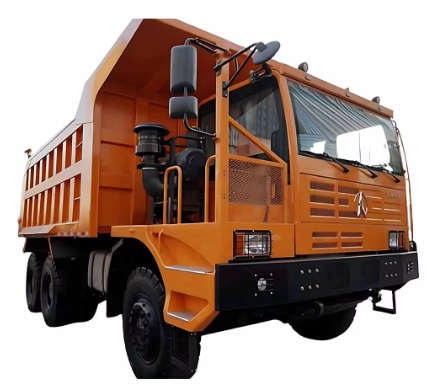Essential Functions of Tractor Trucks in Logistics Networks
Tractor trucks play a pivotal role in the transportation of goods across long distances, enabling the seamless exchange of products and raw materials. According to the American Trucking Association, these vehicles are responsible for transporting approximately 72.5% of freight tonnage in the U.S., highlighting their importance in modern logistics networks. The efficiency of tractor trucks helps shorten transit times, which in turn reduces overall delivery costs. By ensuring quicker, more reliable transportation, these vehicles significantly enhance customer satisfaction and streamline supply chains across extensive geographies.
Adaptability to Diverse Cargo Types
The versatility of tractor trucks in accommodating various cargo types makes them indispensable in logistics networks. From perishable goods to heavy machinery, these trucks are designed to transport a wide range of products efficiently. As logistics demands evolve, the utilization of specialized trailers that can be adjusted according to cargo requirements is on the rise. This adaptability boosts logistics flexibility, as evidenced by the growth in intermodal freight transport that combines different modes of transportation. The ability to efficiently transfer goods promises streamlined operations and maximized efficiency along the supply chain.
Supporting Just-in-Time Delivery Systems
Tractor trucks are fundamental to implementing just-in-time (JIT) delivery systems, ensuring timely arrivals and minimal inventory holding costs. Efficient JIT logistics reduce operational expenses and enhance supply chain responsiveness, as evidenced by various supply chain studies. Furthermore, the integration of advanced routing technology within these trucks helps optimize schedules and delivery routes. This not only aids in meeting tight timelines but also contributes significantly to the success of JIT systems, offering businesses a competitive edge in maintaining lean operations while meeting dynamic market demands.
Technological Advancements in Tractor Truck Operations
Electrification and Hybrid Models
The move towards electrification in tractor truck operations is a significant stride toward sustainability, enabling a substantial reduction in greenhouse gas emissions. With industry forecasts predicting rapid growth, the electric truck market is poised to reach substantial financial milestones within the next few years. Hybrid models also offer a valuable balance by integrating traditional engines with electric power, ensuring flexibility and heightened efficiency across varied driving conditions. These technological advances demonstrate a commitment to environmental goals while enhancing operational effectiveness.
Autonomous and Semi-Autonomous Features
The development of autonomous and semi-autonomous technology is transforming the trucking industry by enhancing safety and efficiency. Automotive research reveals that successful implementation of autonomous trucks may slash transportation costs by up to 30%, bolstering competitiveness in the logistics sector. As regulations and technical standards continue evolving, they pave the way for safer deployment of these vehicles, promising a future where automation plays a crucial role in optimizing logistics operations.
Data-Driven Fleet Optimization
Data analytics stands as a powerful tool for optimizing fleet operations, helping logistics firms lower costs and bolster service quality. Through predictive maintenance, businesses can engage in proactive vehicle management, minimizing downtime and enhancing fleet efficiency. Statistics show that firms utilizing data-driven strategies enjoy a 10-15% reduction in operational costs on average. This transformation underscores the importance of harnessing data to refine processes and achieve superior outcomes in fleet management.
Sustainability and Environmental Considerations
Transition to Zero-Emission Vehicles
Transitioning to zero-emission vehicles (ZEVs) is a critical step in reducing the transportation industry's carbon footprint. These vehicles, designed to emit no tailpipe pollutants, are essential in efforts to combat climate change and promote environmental sustainability. Major cities worldwide are implementing regulations that mandate the adoption of ZEVs, with several planning to phase out diesel trucks in the coming years. Research supports this shift, indicating that a widespread transition to ZEVs could cut emissions by over 30% in the next decade, significantly aiding in the global fight against climate change.
Role of Government Incentives and Policies
Government incentives, such as tax credits and subsidies, are crucial in promoting the adoption of green technologies across logistics fleets. An analysis by environmental agencies highlights that these incentives help lower financial barriers, making it more feasible for companies to transition to cleaner technologies. Furthermore, collaborative policies between the government and the logistics sector can enhance investments in sustainable infrastructure. By working together, these stakeholders can develop robust frameworks that support long-term environmental goals and economic growth, promoting a healthier planet for future generations.
Impact on Corporate Carbon Footprints
Modern companies are increasingly focused on reducing their carbon footprints to align with sustainability goals and meet evolving consumer expectations. Industry studies reveal that logistics firms that adopt sustainable practices can enhance their brand perception and bolster customer loyalty. Quantifying carbon emissions plays a pivotal role in this effort, providing organizations with actionable data to better strategize their sustainability initiatives. This also ensures compliance with regulations designed to uphold environmental standards, allowing firms to confidently advance toward their sustainability targets while fostering a solid reputation in the marketplace.
Addressing High Upfront Costs
The high purchase and maintenance costs of advanced tractor trucks pose a significant barrier to entry for many logistics companies. Without the necessary capital, companies struggle to upgrade their fleets, hindering their operational efficiency and competitive edge. Economists suggest that developing robust financial models and forming strategic partnerships can be effective in alleviating these costs. Collaborations with financial institutions can provide leasing options or loans with favorable terms, thus facilitating fleet upgrades. Additionally, the long-term savings derived from improved fuel efficiency often justify the initial expenditure, making the upgrade economically viable. As we consider these financial strategies, it's clear that investment in modern tractor trucks is a proactive way to enhance operational capabilities and long-term profitability.
Infrastructure Limitations for Electric Models
The lack of adequate charging infrastructure remains a critical challenge for the efficient operation of electric tractor trucks. As more logistics companies transition to electric vehicle fleets, the demand for charging stations has surged, yet infrastructure development has not kept pace. Statistical evidence suggests that the growth and adoption of electric trucks stalls without parallel infrastructure development—hampering efficiency and impacting delivery timelines. To overcome this challenge, investments in building and maintaining charging stations are crucial. Additionally, collaboration between logistics firms and local governments can drive infrastructure growth and ensure it meets future demand. Addressing these infrastructure limitations is key to gaining the operational efficiency that electric tractors promise.
Workforce Development and Retention
The logistics sector is facing a workforce shortage exacerbated by demanding operational conditions and an aging workforce. The high turnover rates pose a significant risk to maintaining efficiency and quality in logistics operations. Strategic initiatives focusing on training and retention programs are essential for building and retaining a skilled workforce. By investing in comprehensive training programs, we equip employees with essential skills and boost their confidence to handle complex logistics operations. Furthermore, industry studies show that companies investing in employee development experience improved workforce stability and satisfaction. These strategic approaches not only mitigate workforce shortages but also contribute to a sustainable and resilient logistics operation.
FAQ
- What are the main functions of tractor trucks in logistics? Tractor trucks are crucial for facilitating long-distance freight movement, adapting to diverse cargo types, and supporting just-in-time delivery systems.
- How do tractor trucks contribute to sustainability? The transition to electric and hybrid models in tractor trucks reduces carbon emissions, aligning with global sustainability goals.
- What challenges do electric tractor trucks face? The primary challenge is the lack of adequate charging infrastructure, which hinders the efficient operation of electric tractor truck fleets.
- How can logistics companies manage high upfront costs? Companies can alleviate costs through strategic partnerships, robust financial models, and options like leasing, thus facilitating fleet upgrades.
- What role do government incentives play in logistics? Government incentives, such as tax credits and subsidies, support the adoption of green technologies within logistics fleets, promoting environmental sustainability.
Table of Contents
- Essential Functions of Tractor Trucks in Logistics Networks
- Adaptability to Diverse Cargo Types
- Supporting Just-in-Time Delivery Systems
- Technological Advancements in Tractor Truck Operations
- Sustainability and Environmental Considerations
- Addressing High Upfront Costs
- Infrastructure Limitations for Electric Models
- Workforce Development and Retention
- FAQ

